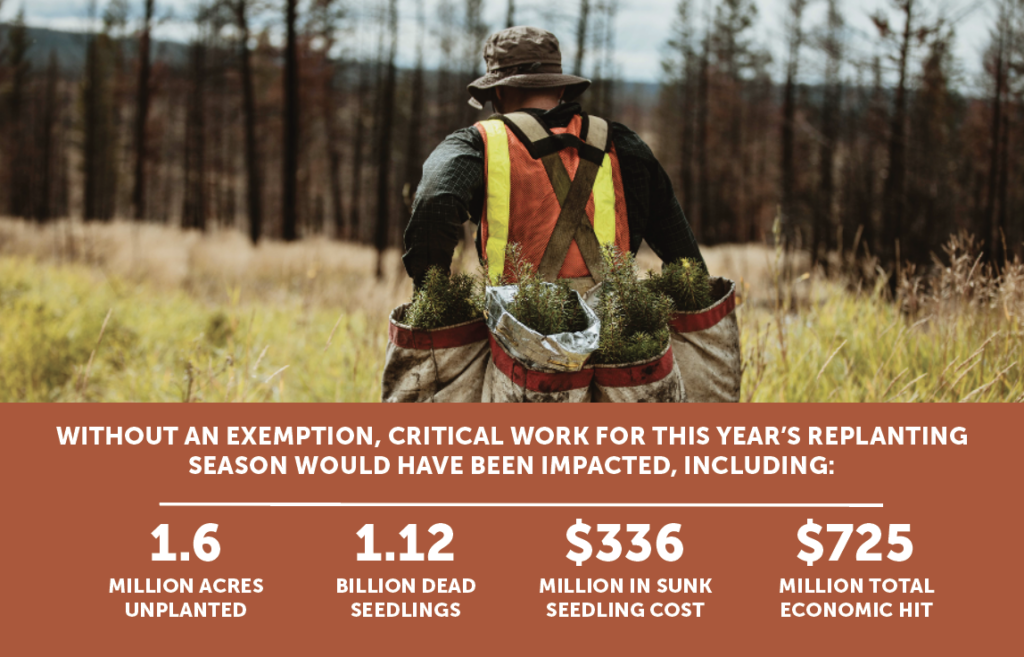Following guidance issued by the State Department on August 12, forestry employers may now have an opportunity to receive special immigration exemptions under the H-2B temporary guest worker visa program, given certain conditions are met. This action was in response to a June 22 Presidential Proclamation that suspended the entry of H-2B visa guest workers, including tree planters, and many other temporary worker visa categories from admission into the country through the end of the year.
According to the guidelines, forestry employers wishing to receive an exemption must demonstrate that the nature of their labor is “necessary to facilitate the immediate and continued economic recovery of the United States.” In addition, businesses are required to advertise available jobs to U.S. workers before employing H-2B guest workers. The Forest Resources Association (FRA) has developed a set of guidelines for businesses seeking the exemption which outlines the criteria for application.
A Collaborative Advocacy Effort
FRA, National Alliance of Forest Owners (NAFO) and Forest Landowners Association (FLA), have been instrumental in advocating on this issue and communicating with the White House and members of Congress. The group conducted a survey of forestry employers who employ H-2B guest workers. That study indicated that 1.6 million acres of land will go unplanted and more than a billion seedlings would perish if non-immigrant labor is not available to perform the work this season, resulting in a loss of more than $725 million to America’s rural economies.

“The nation’s rural economies and tens of thousands of U.S. jobs in the forest products supply chain depend on the critical work performed by H-2B guest workers,” FRA President Deb Hawkinson said. “Without the flexibility provided by the Administration’s guidance, critical forestry work would not have been performed this year, further harming the economy and our efforts to recover from the effect of the pandemic.”
Rep. Bruce Westerman (R-AR), the only registered forester in Congress and the co-chair of the Congressional Caucus on Working Forests, was also instrumental in communicating with the White House. Rep. Westerman recently published an opinion piece in The Hill, discussing the essential nature of the forest industry and why seasonal migrant labor is important.
Forestry is essential, providing everything from shipping boxes to paper towels. Even during COVID-19, we require guest workers to assist with planting and wildfire prevention, and @POTUS recently granted our request for an H-2B visa exemption.
More here: https://t.co/roOO0a68Vb
— Rep. Bruce Westerman (@RepWesterman) August 19, 2020
Next Steps for Forestry Employers
While the Department of State guidance was a great victory, the process is far from over. Now, the forest industry is at the mercy of consulate offices to approve their exemption requests and process the respective H2-B visas. According to the most recent update from FRA, they have reached out to consulate offices in Mexico, Honduras, Guatemala, Ecuador, and Nicaragua to provide them with information on the importance of H-2B guest workers for forestry work in the United States.

Hayden Henson is a Partner with Superior Forestry Services, a Georgia Forestry Association (GFA) member company, in Tilly, Arkansas. His company hires approximately more than 500 H-2B guest workers from Mexico each year to plant trees and manage vegetation across 13 states, and he says landowners can expect some delays in planting this year.
“Basically what it is going to come down to is the status of the consulates. From our understanding, the Mexican Consulate is still under half capacity due to COVID-19 restrictions and there is a delay in processing the visas,” Henson said. “We are optimistic that we will get the labor we need, but landowners should expect at least a few weeks delay.”

